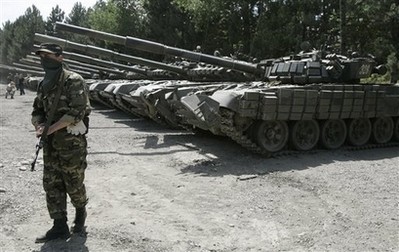Joining in the hard-line rhetoric, Secretary of State Condoleezza Rice accused Russian President Dmitry Medvedev of failing to honor a promise to withdraw troops quickly from Georgia under terms of a cease-fire he signed Saturday.
"I hope this time he'll keep his word," Rice said after Medvedev announced the withdrawal would begin Monday.
Shadows of the Cold War emerged as the Bush administration struggled for the appropriate response to Russia's aggression against its smaller U.S.-backed neighbor, which Moscow ruled for most of the two centuries before the 1991 breakup of the Soviet Union.
"I think that there is a real concern that Russia has turned the corner here and is headed back toward its past rather than toward its future, and my hope is that we will see actions in the weeks and months to come that provide us some reassurance," Gates said.
"We obviously are going to have to re-evaluate the direction of the strategic relationship with Russia going forward, and again, that depends to a considerable extent on their behavior from this point forward."
Rice said Medvedev had pledged that when Georgia's president signed the cease-fire, Russian forces would begin to withdraw. But that did not happen.
"Russia currently is not in compliance with that cease-fire," Rice said. "I don't have an explanation because I would think that when the Russian president says that a signed cease-fire accord will mean the withdrawal of Russian forces, that Russian forces would then withdraw. They did not. However, yet again, the Russian president has given his word, and this time, I hope he'll honor it."
Gates said that Vladimir Putin, the former Russian president who shifted to prime minister when Medvedev took over this year, "clearly, as far as I'm concerned, has the upper hand right now" over Medvedev.
"I think we had seen them more as partners. And there had been a lot of signals from Putin that he was going to allow power to flow, to stay with the president, that Medvedev would be in charge, would be the person responsible for leading Russia going forward. The steps he's taken in the transition from president to prime minister in recent weeks, and now, certainly, in Georgia, at least in my opinion, bespeak more of Putin having his hand on the steering wheel than anybody else," Gates said.
"This looks frankly to me more like decisions made by the prime minister than by the president," he added.
Fighting broke out after Georgia launched a massive barrage Aug. 7 to try to take control of the separatist province of South Ossetia. The Russian army quickly overwhelmed Georgia's forces and drove deep into the country, raising fears that of a long-term Russian occupation.
"If Russia thought it was going to be able to bring down the Georgia state, bring down the democratic institutions, it has failed," Rice said. "What they've done instead is to bring down Russia's reputation as a potential and I want to emphasize potential partner in the international system."
Russia's foreign minister said this past week that Georgia could "forget about" getting back the breakaway provinces of South Ossetia and Abkhazia, which sympathize with Moscow. President Bush said over the weekend that Russia's vision of Georgia without those regions was a nonstarter and that Georgia's borders need to be respected.
Gates said "no one should try and force them back into a full relationship with Georgia." Negotiations should settle their status, he said, rather than a fate "brought about by Russian military force."
Rice is set to go Belgium this week for meetings with the foreign ministers of NATO allies and European Union officials to show support for Georgia. The U.S. is backing efforts by Georgia and a second former Soviet state, Ukraine, to join NATO, much to Moscow's opposition.
Ukraine last week ordered limits on the movement of the Russian ships since they were deployed to Georgia's Black Sea coast as part of Russia's military onslaught.
"If the Russians intended this as intimidation, they have done nothing but harden the attitudes of the small states around them," Rice said. "I think the Russians have made a significant mistake here."
She cited Ukraine's port action and the signing Thursday of an agreement between Poland and the U.S. for Poland to accept a missile interceptor base as part of a system the U.S. says is aimed at blocking attacks by adversaries such as Iran. The missile deal awaits approval by Poland's parliament and signing by Rice during a future visit to Warsaw, possibly in the coming week.
A top Russian military officer said that agreement put Poland at risk of attack, perhaps with nuclear weapons.
"It strikes me as pretty strident rhetoric and probably fairly empty rhetoric," Gates said. "The truth of the matter is, Russia is not going to launch nuclear missiles at anybody. The Poles know that. We know it."
Rice and Gates pressed the administration's case during appearances on five Sunday talks shows - Rice on "Fox News Sunday," CBS' "Face the Nation" and NBC's "Meet the Press," and Gates on ABC's "This Week" and "Late Edition" on CNN.

A Russian soldier guards armored vehicles allegedly captured from the Georgian military, in Tskhinvali, South Ossetia on Sunday (AP Photo/Dmitry Lovetsky)
http://accesswdun.com/article/2008/8/212458
